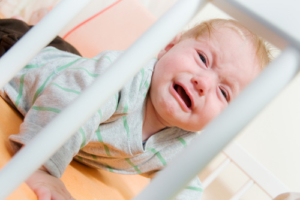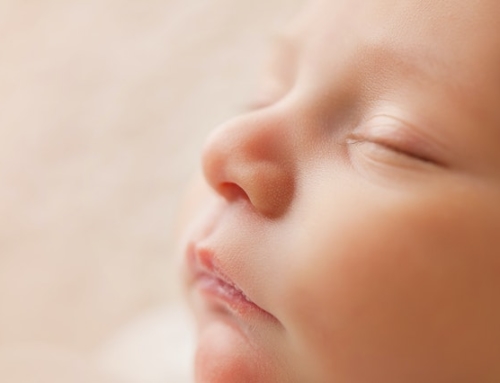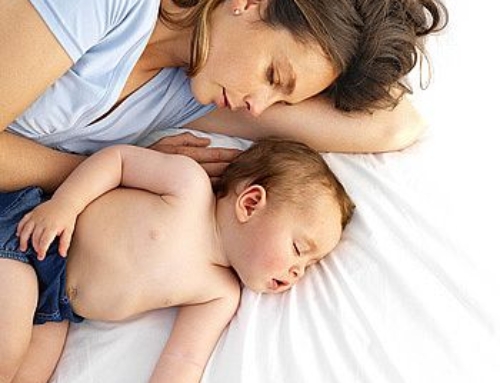 Recently an article came out in the Daily Mail in the UK with the headline “Sleepless nights caused by crying babies ends one in three marriages, research claims”. Okay, first, it’s the Daily Mail so no one should take too much stock, but the fact remains people will. It fits with what our society wants to hear; namely that babies shouldn’t be waking and crying and that sleep training is good. But let’s take a bit more of a critical look at this article—line by line—to see what we can really glean from it, starting with the title…
Recently an article came out in the Daily Mail in the UK with the headline “Sleepless nights caused by crying babies ends one in three marriages, research claims”. Okay, first, it’s the Daily Mail so no one should take too much stock, but the fact remains people will. It fits with what our society wants to hear; namely that babies shouldn’t be waking and crying and that sleep training is good. But let’s take a bit more of a critical look at this article—line by line—to see what we can really glean from it, starting with the title…
Headline: Sleepless nights caused by crying babies ends one in three marriages, research claims.
Catchy isn’t it? 33% of marriages are ending because babies cry. Taken at face value, all I can think is, “What the hell is wrong with you people?” Babies CRY. They wake at night. You get less sleep. That’s what happens when you have a BABY. Do people really not know this?
Subhead: Survey of 2,000 parents found on average they get six hours sleep a night.
Okay, now it’s a survey. Raises some questions, first of which is who did they poll? Surveys are only helpful if you’ve tapped a broad enough demographic. But also, six hours of sleep doesn’t sound too awful. Especially if you consider that you’re SUPPOSED to nap with baby. I realize that’s not always possible for people who have to return to work, but that’s more of a problem with the structure of society than babies crying.
Subhead: 30 per cent of those who had split up blamed sleepless nights caused by children
Wait… I thought you said one in three MARRIAGES ended from crying babies. Now it’s 30% of people who had already split up? With an average rate of 50% divorce, 30% of 50% would be 15% of marriages. Apparently math isn’t your strong point now is it? And now it’s children not crying babies? Do you actually know what the research is?
Sleepless nights caused by a crying baby are blamed by parents for the breakdown of up to a third of relationships, research shows.
Parents with a young child get about six hours sleep a night, an hour less than is recommended.
We’re repeating the subheading here, with the same math problems that plagued the headline and subheader. Now, an hour is missing from recommended norms. Well, first, there’s the problem that an hour can be made up in various ways provided mom or dad can take a nap during the day. Or go to bed an hour earlier. Yes, it means giving up some alone time or sacrificing getting everything done, but that’s okay. If you’re truly sleep deprived, getting your sleep is more important than watching a show with hubby, doing the laundry, or cleaning the kitchen. It truly is. However, I’m now confused as to the age range of these children.
Experts also say that adults need at least five hours’ uninterrupted sleep to be able to function and concentrate properly the next day.
Yes, “experts”. Unfortunately this type of research is done on non-parents with jobs that require specific forms of concentration and actually ignores a wealth of history on sleep. Did you know that five hours’ uninterrupted sleep is actually NOT the norm for human history? We used to sleep in four hour chunks with a night waking of at least one hour in between (see here). But even if we accept five hours, things are different for parents. Nowhere ever has anyone recommended (until now) that young babies sleep five hours straight. NEVER. Babies need to wake every few hours (at most) to feed if breastfed. That’s what they expect physiologically. Now, we tend to accept that evolution (or God) doesn’t really screw up all that much so why would we “need” five hours uninterrupted sleep and then have it be impossible to obtain? Doesn’t make much sense. Especially as the outcomes aren’t benign but could be potentially dangerous. Yeah, me thinks this five hours business doesn’t really fit with parents, eh? A lot changes when you have kids.
A survey of 2,000 parents found that 30 per cent of those who had divorced or separated blamed sleepless or interrupted nights caused by their children.
Again we’re back to this math problem. Really, someone needs to go back to school.
However, now let’s talk about the fact that it’s parents simply blaming their sleep by children… I hear kids thinking, “Thanks mom and dad. Glad to see your relationship was so strong, that you went into this parenting business with enough knowledge and awareness to not let a little thing like my physiological norms ruin your entire relationship.”
In my opinion, any couple who blames their children for their break-up is way too immature to have a responsible relationship and frankly, I wonder about their maturity level to raise children too.
Eleven per cent admitted pretending to be asleep when their child woke up so their partner would have to deal with them.
Another 11 per cent said they shut the door to block out the noise while 9 per cent turned up the television.
Given the mathematic mess that this article is I have no idea if this is per cents of the entire sample or those who divorced. No clue. Regardless, we can probably assume we’re dealing with younger babies here given the level of noise discussed (older kids tend to just get out of bed and come find you unless you’re locking your kid in, in which case we need to have a much more serious discussion).
Does anyone else wonder if the fact that these parents are doing everything they can to IGNORE their children says more about their relationship style in general than the children’s actual behaviour? I mean, if you do your best to ignore your child, I can conclude two things: (1) you probably will have more sleepless nights because your kid will cry for longer than if you just go get them, but (2) you’re probably a pretty shitty person to be in a relationship with. If your partner asks for your help at 2am, do you pretend to be asleep? If they come home and ask for help, do you shut the door or turn up the TV? You may not do those things, but I bet your level of empathy and responsiveness to your partner is on the lower end as well. Ever think THAT might be the reason for the break up?
One in 20 said they had become so tired they had fallen asleep behind the wheel.
And here we hit the real problem. Five per cent of people are having serious sleep problems. This tells me not that their children have problems and need “fixing” but that they need better ways to gently deal with night wakings. Remember – night wakings are NORMAL. That’s important and worth talking about.
The poll was commissioned by Channel 4 for advice phone-in show Bedtime Live, which starts tomorrow at 8pm.
Ah – and here we have the source. Sorry, but I don’t think you can say “research says” with this. No, a TV station looking to promote a show that promotes CIO did the research. Need I say more?
Psychologist Tanya Byron, who appears on the show, said: ‘I see people whose children have chronic sleep problems and they’ll say things like their children get really upset if they try to send them to bed.
‘Well, I promise you, they won’t hate you in the morning when they’ve had a proper rest.
‘Our generation struggles with discipline much more than any other, but the lack of boundaries will only cause more and more difficulties.
‘From a clinical perspective, a lot of those I see in my own clinics, predominantly children, have underlying issues with not getting enough sleep, even if that isn’t the problem they are presenting with.
‘Behavioural difficulties, family issues, learning and concentration issues: there is a significant number of these common problems which have poor sleep at the heart of it.’
This is hard. Yes, lack of sleep in OLDER children is a problem in our society (ever wonder if our weird schedule with school and work has something to do with it?) and they do manifest in various ways, including behavioural difficulties, etc. And yes, we have a society that does seem to struggle with boundaries, but also puts boundaries up in the weirdest of places and not in others. That’s important to acknowledge.
BUT… first, she seems to be referring to older children who struggle, not babies or younger toddlers. Second, she speaks to children fighting at bedtime. Ever think that it has to do with the mass amounts of sleep training done at earlier ages? Bed NEEDS to be a safe and warm place for children to welcome it (see here) and when we teach our children early on that it’s filled with neglect and fear, why on earth would we expect them to embrace it? In this case, you can’t expect that forcing children to bed, alone, again, will solve the problem. It just won’t! We need a total shift in our thinking of infant and child sleep in order to promote healthy sleep for life. This show is NOT that shift.
Recent research by US scientists showed that a good night’s sleep improved a couple’s relationship by making them less selfish.
The academics, from the University of Berkeley, California, found that couples who slept well were more likely to be polite to each other.
I’ve actually addressed this research already (see here). Basically, sleep research on non-parents really can’t be translated to parents. It just doesn’t work because the demands and the needs and the constraints on the relationships are completely different. We need parents and the media to understand that.
***
At the end of the day we have another misguided piece set out to promote the training of children and babies with respect to sleep. And it sucks. Parents need to know that night wakings are normal. That children need responding to and that there are gentle ways of getting your babies and toddlers to sleep more than they are.
To read more on normal infant sleep, please check out this series on the topic from myself and various others (including academics who do actual research):
Part 1: The Critical Roles Of Feeding Method And Changes In Development
Part 2: The Importance Of Understanding Individual Patterns In Sleep
Part 3: Normal Parent Behaviours And Why They Won’t Hurt Your Child
***
If you are in need of individualized parenting help with sleep or other areas, I offer science-based, gentle, and attachment-focused help via email, Skype, or phone. You can find out more here.






[…] Recently an article came out in the Daily Mail in the UK with the headline “Sleepless nights caused by crying babies ends one in three marriages, research claims”. Okay, first, it’s the Daily Mail so no one should take too much stock, but the fact remains people will. It fits with what our society wants to hear; namely that babies shouldn’t be waking and crying and that sleep training is good. But let’s take a bit more of a critical look at this article—line by line—to see what we can really glean from it, starting with the title… https://gku.flm.mybluehost.me/evolutionaryparenting.com/babies-are-killing-marriages/ […]
Hi there!
Just love reading your articles on parenting. They are an eye opener.
Lately a friend of mine, bhanvreen , contacted you and discussed about my two year old son not eating properly, not sleeping for long hours at night and still breast feeding.
I have introduced him to all kinds of food. It’s not that he doesn’t accept anything! But it’s not that he will always eat! His inclination is more towards feeding and he doesnot accept bottles or pacifiers. There are nights when he nurses for long hours continuously and it is painful.
People have been telling me to let him cry for two three nights to put him behind the habit. But I don’t have the heart to do that either.
It’s not that he does that because he is hungry. I feel it’s just his sucking reflex. Because even when he eats properly, he does that.
I really need your help on this. Please look into the matter and suggest the needful!
Regards
Aastha gupta
Can you email me and explain more details? For example, what does a usual day look like with respect to food – what does he eat and when? And also what the sleeping pattern is like.
I have a 9 week old boy who co-sleeps with us. He started out snuggled up to me on our bed, and is now straddling the tiny mattress gap between his 3-sided crib and our bed (an improvised version of those expensive co-sleeper beds I saw on Amazon). He wakes up to feed enough that my husband and I are both a bit tired during the day, but nothing worse than a lot of my previous professional jobs have left me. As a couple, we’re doing fine. We have always been super tight and on the same page for life-decisions, and we still are.
In contrast, several years ago, before I met my husband, I was in a long term relationship with someone I liked but came to realize I didn’t love- at least not in the right way. It was comfortable- but a bit more like housemates than romantic partners. Being in my mid-30s at the time, I figured this was as good as I was going to get (stupid me) and we decided to try for a baby while I still could. Luckily, nothing came of it.
Looking back now, it would have been disastrous on so many levels. I had been thinking about my future relationship with the baby more than how I’d have to work within my relationship with my then partner. The way we were together wasn’t built for adding a baby to the equation. I don’t think he even wanted a baby but was doing it because it was what people our age should do. I can’t help thinking that a lot of these marriages that were killed by sleeplessness due to parenthood just weren’t very strong to begin with, or they were having babies because of pressure or tradition. If you’re a bit cranky with your partner or if you don’t have a solid foundation or common goals at the best of times, it isn’t going to work when you’re exhausted.
Thank you, thank you, thank you!
I have come to the habit of simply referring to your site when discussing CIO. I honestly didn’t think anyone was actually doing CIO, but got an abrupt wake-up call (so to speak) when I found that a friend of mine, when boasting of her perfect little one (we had kids only weeks apart) had done just that! Her girl is so much more insecure than my son.
Once she hurt herself because she disobeyed mum and she wasn’t allowed to cry for more than a few seconds because of it. It felt so harsh.
Now, my son is truly a handful sometimes, but he is very resilient! One could argue whether he is strong-willed or just plain disobedient (he will not comply to ‘no’), but it is almost always possible to negotiate (ofcz I don’t negotiate on dangerous things), I always say that I’m not done raising him yet! It honestly ends any discussion ? . He is only four years old.